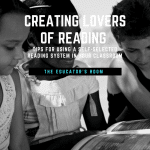When your child begins to read it is a thrilling moment. Then the press to rush their skills begins. We have this desire to move them up the ability ladder ASAP. As parents we want them to be in the highest reading group. We hope for high test scores. We picture Harvard or Stanford in their future. It will all be possible if only they can be the best reader.
Stop! Right now! Take a deep breath. Yes, reading makes all these things possible but pushing doesn’t make a good reader. Interest and connections make a good reader.
Try this: Pick up a trade manual or find a scientific article on a topic you’ve never studied. Spend just five minutes with it. This is what it is like when we push a child beyond their reading ability. They glaze over. If you stay at it, their reading does not get better. Instead, they begin to hate reading.
When you take a trip to the library or the book store, try these strategies to find books that are worth your time and investment. Many of the strategies go hand in hand.
1. The Five Finger Test. If you are not sure of your child’s reading level or if he has picked a book by its cover, this is a strategy you can use to see if the book is something he can really read. Pick a page from the middle of the book. Ask your child to hold up five fingers and begin reading the page aloud. Each time he encounters a word he doesn’t know he puts a finger down. At the end of the page (or a reasonable passage length) he should still have one or two fingers up. If all his fingers are down, you may determine you still want to get the book to read aloud to him. If all his fingers are up, the text is easy for him. This isn’t a bad thing. (See #4)
2. Nonfiction Captions. Let’s say your daughter has a thing about horses and has chosen a book about them. You can do the Five Finger Test on the captions. This is often a strategy to enter into nonfiction. If the captions are within her reading ability, she may use them as away into the regular text as she looks for more information about the concept shown in the photo.
3. Multilevel Texts. Many books, both beginning fiction and nonfiction have text written on two levels. (Search for these under “read together” or “we both read.”) These books have simple beginning text for your child to read and more difficult text for you or an older child to read. Frequently these have more information and richer storylines than simple beginning readers. This is a great way to help support their reading.
4. Tried and True. If your child wants to read Junie B. Jones yet again or begs for Frog and Toad even though she has read them all, don’t despair. Although you know they are too easy for her, let her reread them. Familiarity with text builds fluency, a skill that supports her reading prowess. In addition, there is nothing wrong with having a character or storyline you love. I’m not sure I want to admit how many times I have read the Harry Potter series, or Pride and Prejudice. Having a book you simply never tire of is a fine thing.
5. Magazines. Magazines are a great way to encourage reading for readers of all levels. There is a wide range of reading abilities. Articles tend to be short enough for beginning or struggling readers. The captions are often at an easier level than the text. My daughter was a struggling reader but loved magazines because she could use the visual clues from the pictures to help with the text.
6. Talk to the Staff. Both librarians and book store staff know their stuff. Ask for suggestions based on reading ability, interests, and your child’s favorite books. They know what is new and what is popular. They also know the old stand-bys that may have fallen out of vogue but are reading gems. They can help you find books at the right level of ability and interest.
7. Leveled Books. There are many series of leveled books. Not all Level Ones or Twos are equal even within a series. This is especially true when comparing fiction and nonfiction. (Nonfiction text is usually harder.) Take your time looking at what they offer rather than just the label.
8. Determine the Purpose. We read for enjoyment and to gain knowledge. When your child picks a book ask why it interests her. This isn’t meant to be a quiz. Keep it simple. If it is because her friends are reading it, use the five finger test to see if she can read it. I don’t think there is anything wrong with carrying around a book you wish you could read. It shows a curiosity of what is in the text. Just be sure to have material that she can read available.
9. Don’t forget to pick up a book or two for yourself. It doesn’t have to be a novel. It can be a travel magazine or a book on gardening. The best way to get your child to want to read is by seeing his parents read. You are the biggest role model they have.
Personally, what I want for those beginning readers is to lose themselves in a book. I want them to be transported to a different place. I especially want them to realize the world they live in is much bigger than the block they live on. That is what gets them to Harvard or Stanford.




